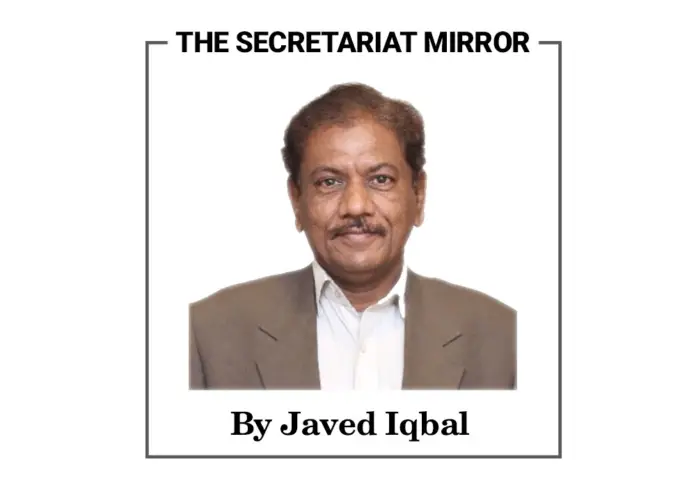It is common today to argue that the government sector is incompetent, corrupt and slow, while the private sector is efficient, innovative and more responsive in comparison. The Pakistani nation has caught between the government sector, the devil, and the private sector, the deep blue sea. Apparently, there seems to be no way out.
We often forget in making this comparison that government agencies are non-profit while private industry operates for profit.
Even in developed countries, including the US, when entrepreneurs are elected to power, they try to make the government more like a corporate entity or run it like a business. The two-decade-long Afghan imbroglio is a classic example.
Moreover, former US president Donald Trump was the best example.
If we talk about corruption and bribery in government institutions, we see that private parties incite officials to work for money. They do it willingly. In the public sector, every task of the government is taken for granted as there is poor performance audit.
When I spoke to a key position-holder official working in the Punjab government, he said that Pakistan is a democratic country where people give their political leaders the right to rule, and these political people control the bureaucracy for their benefit. Their only concern is development in their respective constituencies and recruiting voters to cement affiliation. The culture of commission is very rich.
Many efforts have been made to improve the bureaucracy. Many commissions and task forces had been constituted, but no improvement could be achieved. This failure led to failure to feel the pulse of problems. Their solution is a far cry.
If you want the bureaucracy to be better, you should have elected honest and competent politicians, if there are any, to control the bureaucracy, otherwise, the later will not be controlled.
Another officer said that unless you properly patronize the bureaucracy, it starts working for rulers while ignoring the hapless people. The same has been happening in Pakistan for decades, and there is no panacea for the hoi polloi.
Talking about recent unprecedented developments in the education sector, he said it is a good initiative to provide free books to students, but what mafias do in connivance with bureaucratic vicious circles cannot be ignored.
According to the audit reports, he noted that irregularities of three and half billion rupees in the Khyber Pakhtunkhwa Textbook Board surfaced in the current year, printing more than required books, overpayments in royalty and misuse of authority are some grey areas. Likewise, there are not enough books available for students in Punjab schools despite the academic year fast shrinking. In contrast, free books are publicly available in the open market. This is a big question mark on the system.
When such things start, the rule of law ends. The very purpose of politics is to ensure good governance becomes obsolete. It becomes a zero-sum game with rampant corruption everywhere. The result is the kakistocracy that the government is run by extremely incompetent and inappropriate people. The steep fall of the great Mughals is a classic example of this.
Moreover, everything was like ours in America. Bureaucracy was not responsive and political people were placed in important positions. But in the 1800s, the Pendleton Civil Service Reform Act of 1883 established a modern civil service independent of the elected political elite. But with us, the case is completely reversed. Here the bureaucracy is always reinventing the wheel, and the nation is moving backwards.
It is also said that if you want to improve administration, give the officers more money i.e. salaries, improve their working environment, train them better and let them make decisions according to the law. There should be no political interference. Then see how things don’t get better. Here the officers were given financial benefits in the name of allowances, but they were not given the freedom to work or an elaborate system of internal accountability like KPIs and this only burdened the kitty while failing to bring excellence to the system.
China has made so much progress in such a short time because of the apolitical administration. Bureaucracy always puts its country’s interest and the rule of law before all other pursuits. Such persons who commit any sort of corruption are destined to be hanged.
It is said that the government that governs the least is the true government. It means efficiency can only be achieved by governing smaller areas. There should be decentralized sectors with more devolution of powers. Gen Musharraf’s plan for city district governments, as many critics claimed, was the best one. But, later, governments reversed it to recentralize powers for their gains.
Good governance is the soul of any democracy. Unlike a dictatorship, elected politicians form the government, whose responsibility it is to appoint the right people to the key positions and then exercise strict control over them. But unfortunately, it is the politicians who tried to monopolize the decision-making power. The bureaucrats will also be restrained from their responsibilities. In other words, in democracy, we amalgamated oversight and operation.
In the West, democracies have travelled hundreds of years to reach this point, but we got it overnight in 1947. Here we could not adapt it to our environment.
Here, the highly educated and extremely ignorant were given equal rights to vote. The result was societal ignorance.
Like Indonesia, the government should set targets for 2030. There should be a building of ownership and commitment in all government institutions that they lacked altogether. The capacity building of human resources should be the main thing. The government should create an enabling environment for resource mobilization, all development should be well-planned and data-driven not politically motivated as is in our country. The government should devise developing policies, planning and intervention programs on a priority basis for the categories of education, energy, agriculture, forestry, environment and health sectors. Last but not the least, there should be a strict target-oriented monitoring and review system. But who will bell the cat?
Anil Swarup in his famous book ‘Ethical Dilemmas of a Civil Servant’ gives a beautiful insight into bureaucratic circles calling a Catch-22 situation. He reiterates, “Always keep the interest of the common man above all.” But the real on-ground position is quite pathetic.
We need a moral compass to bring a good governance model with accountability as a thumb rule. Otherwise, the ongoing political mess and official inefficiency may ultimately lead the nation to a point of no return.







